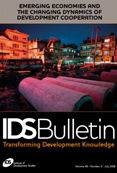Emerging Economies and the Changing Dynamics of Development Cooperation

(Photo:IDS)
Emerging countries have been reshaping the contours of development cooperation as “new donors” for the last two decades. However, behind such high-profile nations as the BRICS economies, there is a larger array of lesser-examined new contributors. These nations have not been accorded due attention by the international community despite their promising engagement with development agendas. What form will cooperation take in the future through the combined assistance of both new and traditional donors to the development landscape?
This special issue of the IDS Bulletin is a collaboration between the JICA Research Institute (JICA-RI) and the Institute of Development Studies (IDS). Through a broad and holistic lens, the issue explores the manner in which changing dynamics will affect future cooperation and partnerships among donors.
The editors of the special issue note in their introduction that the difficulty of probing deeper into emerging donors lies in the very dichotomy of the term “emerging and traditional donors.” In contravening this polarity, the issue seeks to counter the asymmetry of the existing literature, the global understanding on the subject, and the policy approach to these contributors, and bring fresh insights into development cooperation.
The topics encompassed by the articles in this special issue are wide-ranging. Papers explore diverse themes such as the importance of knowledge in the development cooperation experience of emerging economies; the challenges involved in the policy formulation and implementation of triangular cooperation; the dynamics of ‘two-way interaction’ between donors and recipients in chains of knowledge creation; and the vital reassessment of critical data upon which estimates of China’s foreign aid disbursements are effected and understood in comparison to international standards.
JICA-RI Visiting Fellow Naohiro Kitano served as an editor and JICA-RI Senior Research Advisor Akio Hosono, Senior Research Fellow Hiroaki Shiga, and Visiting Fellow Jin Sato contributed to the issue.
scroll